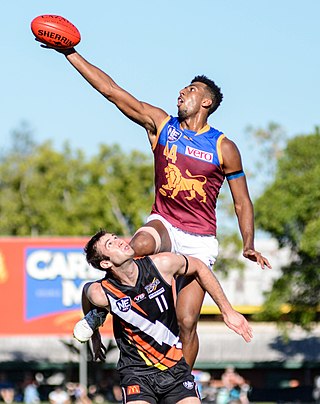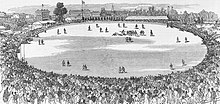
Australian rules football, also called Australian football or Aussie rules, or more simply football or footy, is a contact sport played between two teams of 18 players on an oval field, often a modified cricket ground. Points are scored by kicking the oval ball between the central goal posts, or between a central and outer post.

Robert Jeffrey Harvey is an Australian rules football coach and former player. He is currently an assistant coach for the St Kilda Football Club in the Australian Football League (AFL). As a player, he played his entire career with St Kilda in the AFL. Following retirement, Harvey embarked on a career in assistant coaching which has spanned across three decades, highlighted by a nine-game stint as caretaker head coach of the Collingwood Football Club in 2021.
A State of Origin competition is a type of sporting event between players representing their state or territory. State of Origin began in Australian rules football on 8 October 1977 between Western Australia (WA) and Victoria, at Subiaco Oval in Perth, the initial brainchild of Leon Larkin. The selection criteria for Australian football have varied, but they are generally applied to players who have played most of their juniors games in a particular state or territory, hence the name "State of Origin". In Rugby League the criteria are different, where players are selected for where they either first played senior Rugby League or where they played in the majority of senior competitions. The annual Rugby League State of Origin series is one of Australia's most popular sporting events. The name is also used in Australia for small sporting events which generally involve domestic representative teams.

Garry Peter Lyon is a former professional Australian rules football player and was captain of the Melbourne Football Club in the Australian Football League (AFL). Since his retirement from football, he has been mainly an Australian rules football media personality, featuring on television, radio and in newspapers. He has also coached during the International Rules Series. He is the most recent VFL/AFL player to kick ten goals in a finals match, having done so in the 1994 Second Semi-Final against Footscray, and the first since Geelong's George Goninon in 1951, 43 years prior.

Representative matches in Australian rules football are matches between representative teams played under the Australian rules, most notably of the colonies and later Australian states and territories. Senior intercolonial representative matches took place from 1879 to the turn of the 20th century. For most of the 20th century, the absence of a national club competition in Australia meant that interstate matches were regarded as important events.
Paul Salmon is a former Australian rules footballer who played in the Australian Football League for Essendon and Hawthorn. Recruited from North Ringwood, Salmon had a prolific career, with many accolades such as being inducted into the Australian Football Hall of Fame, a two-time premiership player, seven-time leading goalkicker at Essendon, and the fourth-highest goalkicker for Essendon.
Donald Neil Kerley was an Australian rules footballer and coach. He is best known for taking three clubs to four South Australian National Football League (SANFL) premierships over three decades as both a player and coach, and for playing 32 state games for South Australia.
Andrew Newton Jarman is a former professional Australian rules footballer who played for the Adelaide Football Club in the Australian Football League (AFL), and the North Adelaide Football Club and Norwood Football Club in the South Australian National Football League (SANFL). He is the older brother of Adelaide legend Darren Jarman and has won the Magarey Medal twice.

The Australian Football League (AFL) is the pre-eminent professional competition of Australian rules football. It was originally named the Victorian Football League (VFL) and was founded in 1896 as a breakaway competition from the Victorian Football Association (VFA), with its inaugural season in 1897. It changed its name to Australian Football League in 1990 after expanding its competition to other Australian states in the 1980s. The AFL publishes its Laws of Australian football, which are used, with variations, by other Australian rules football organisations.
Grantley Craig Fielke is a former Australian rules footballer who played for West Adelaide Football Club in the South Australian National Football League (SANFL), and the Collingwood Football Club and Adelaide Football Club in the Victorian/Australian Football League (VFL/AFL).
The Fos Williams Medal has been awarded since 1981 to the best Australian rules football player from South Australia during Inter-State or Inter-Competition matches. The medal is named in honour of legendary South Australian National Football League (SANFL) player and coach Fos Williams.

Australian rules football began its evolution in Melbourne, Australia about 1858. The origins of Australian football before 1858 are still the subject of much debate, as there were a multitude of football games in Britain, Europe, Ireland and Australia whose rules influenced the early football games played in Melbourne.

The Victoria Australian rules football team, known colloquially as the Big V, is the state representative side of Victoria, Australia, in the sport of Australian rules football.

The Western Australia Australian rules football team is the state representative side of Western Australia in the sport of Australian rules football.
Bruce Norman Lindner is a former professional Australian rules footballer who played for the Geelong Football Club and Adelaide Football Club in the Australian Football League (AFL). He is the nephew of legendary North Adelaide footballer Don Lindner.
Australian regional rivalries refers to the rivalries between Australian cities, states and territories or regions.

The Allies is a composite team competing in interstate representative Australian rules football matches that comprises players from Australian Capital Territory, New South Wales, Northern Territory, Queensland and Tasmania.

Edward James Whitten Sr. OAM was an Australian rules footballer who played for the Footscray Football Club in the Victorian Football League (VFL).

The AFL Grand Final, which is the final premiership deciding match each season in the Australian Football League (AFL), has been played at the Melbourne Cricket Ground in Melbourne, Victoria, every year since 1902, except on seven occasions when the ground was unavailable or because of the COVID-19 pandemic in the case of the 2020 AFL Grand Final; and it is presently contracted to be played there until 2059. Despite the long-term stability in its location, and its natural fit as the largest capacity stadium in both Melbourne and Australia, the ongoing use of the Melbourne Cricket Ground has been controversial throughout its history.
Victorian bias in the Australian Football League is an assertion by critics of the Australian Football League (AFL) that there is a bias or favouritism towards its Victorian-based clubs.















